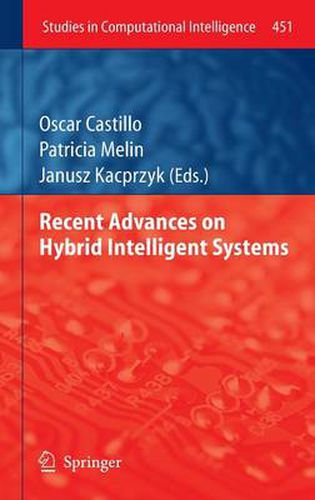Readings Newsletter
Become a Readings Member to make your shopping experience even easier.
Sign in or sign up for free!
You’re not far away from qualifying for FREE standard shipping within Australia
You’ve qualified for FREE standard shipping within Australia
The cart is loading…






This title is printed to order. This book may have been self-published. If so, we cannot guarantee the quality of the content. In the main most books will have gone through the editing process however some may not. We therefore suggest that you be aware of this before ordering this book. If in doubt check either the author or publisher’s details as we are unable to accept any returns unless they are faulty. Please contact us if you have any questions.
This book presents recent advances on hybrid intelligent systems using soft computing techniques for intelligent control and robotics, pattern recognition, time series prediction and optimization of complex problems. Soft Computing (SC) consists of several intelligent computing paradigms, including fuzzy logic, neural networks, and bio-inspired optimization algorithms, which can be used to produce powerful hybrid intelligent systems. The book is organized in five main parts, which contain groups of papers around a similar subject. The first part consists of papers with the main theme of hybrid intelligent systems for control and robotics, which are basically state of the art papers that propose new models and concepts, which can be the basis for achieving intelligent control and mobile robotics. The second part contains papers with the main theme of hybrid intelligent systems for pattern recognition and time series prediction, which are basically papers using nature-inspired techniques, like evolutionary algorithms, fuzzy logic and neural networks, for achieving efficient pattern recognition or time series prediction. The third part contains papers with the theme of bio-inspired and genetic optimization methods, which basically consider the proposal of new methods and applications of bio-inspired optimization to solve complex optimization of real problems. The fourth part contains papers that deal with the application of intelligent optimization techniques in real world problems in scheduling, planning and manufacturing. The fifth part contains papers with the theme of evolutionary methods and intelligent computing, which are papers considering soft computing methods for applications related to diverse areas, such as natural language processing, recommending systems and optimization.
$9.00 standard shipping within Australia
FREE standard shipping within Australia for orders over $100.00
Express & International shipping calculated at checkout
This title is printed to order. This book may have been self-published. If so, we cannot guarantee the quality of the content. In the main most books will have gone through the editing process however some may not. We therefore suggest that you be aware of this before ordering this book. If in doubt check either the author or publisher’s details as we are unable to accept any returns unless they are faulty. Please contact us if you have any questions.
This book presents recent advances on hybrid intelligent systems using soft computing techniques for intelligent control and robotics, pattern recognition, time series prediction and optimization of complex problems. Soft Computing (SC) consists of several intelligent computing paradigms, including fuzzy logic, neural networks, and bio-inspired optimization algorithms, which can be used to produce powerful hybrid intelligent systems. The book is organized in five main parts, which contain groups of papers around a similar subject. The first part consists of papers with the main theme of hybrid intelligent systems for control and robotics, which are basically state of the art papers that propose new models and concepts, which can be the basis for achieving intelligent control and mobile robotics. The second part contains papers with the main theme of hybrid intelligent systems for pattern recognition and time series prediction, which are basically papers using nature-inspired techniques, like evolutionary algorithms, fuzzy logic and neural networks, for achieving efficient pattern recognition or time series prediction. The third part contains papers with the theme of bio-inspired and genetic optimization methods, which basically consider the proposal of new methods and applications of bio-inspired optimization to solve complex optimization of real problems. The fourth part contains papers that deal with the application of intelligent optimization techniques in real world problems in scheduling, planning and manufacturing. The fifth part contains papers with the theme of evolutionary methods and intelligent computing, which are papers considering soft computing methods for applications related to diverse areas, such as natural language processing, recommending systems and optimization.